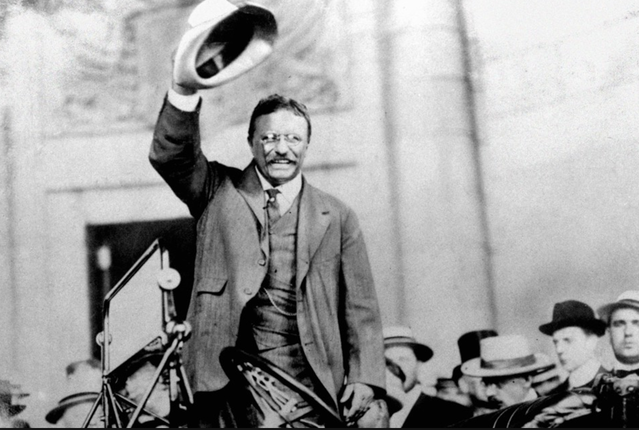On September 14, 1901, Theodore Roosevelt was sworn in as the 26th President of the United States after the assassination of William McKinley. He became the youngest president in history and would lead the nation until 1909. His legacy consists of domestic efforts, such as fighting monopolies through the Sherman Antitrust Act, as well as foreign policies like mediating the Russo-Japanese War.
One aspect that often goes unrecognized about his Presidency was his advocacy for the media. Roosevelt, the first President to hire press officers, often utilized newspapers to promote his policies to the public with the invention of the “media spin.” The media spin is a technique used in interviews to paint responses in the best light with the public. Roosevelt was also famous for his publicity stunts, which included riding 98 miles on horseback to show support for new Army rules and descending to the bottom of Long Island Sound in a submarine to endorse new military vessels. Roosevelt also wanted to show the public that, although he was President, he was also an average American citizen who had to deal with the chores of everyday life, just like everybody else. He showed this by holding informal press conferences in the afternoon–while shaving.
Roosevelt was a huge supporter of investigative journalism and created the term “muckrakers,” which is used to describe journalists who fought for social reform by exposing corruption in all levels of businesses, from factories to executive offices. The information gathered by muckrakers greatly influenced some of Roosevelt’s most famous acts.
After reading Upton Sinclair’s The Jungle, which highlighted the gruesome aspects of the meat packing industry in Chicago, Roosevelt demonstrated his respect for investigative journalism by signing the Pure Food and Drug Act and the Meat Inspection Act. Sinclair sent a copy of his book to the President who then had the meatpacking plants investigated, and the report only confirmed all the unsanitary conditions written in the novel. This led to Roosevelt signing acts still in place today.
After signing these acts, Roosevelt addressed the press and said, “The Congress has done more substantive work for good than any Congress has done at any session since I became familiar with public affairs.”
Like many presidents, Roosevelt had a complicated relationship with the media. The reporters who flattered him in their news columns were often met with insider information about all the aspects occurring in the White House. Yet reporters who publicly criticized his policies were often not given as much political connection to him. This, once again, was due to Roosevelt always wanting a “media spin” and wanting to appear admirable in the newspapers.
During his Presidency, Roosevelt was seen in the public eye as a tough, charismatic leader with a love for the outdoors. When it came time for Republicans to vote in 1904, they did not vote for Roosevelt for his policies, but because of his broad public appeal. Basing one’s vote off of how a candidate presents themselves to the public is not unheard of nowadays. However, because Roosevelt was the first of his kind to utilize his relationship with the public, he is often regarded as the first “modern” President.




































